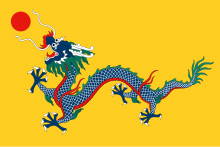Imperial Guards (Qing dynasty)
| Imperial Guards | |
|---|---|
| 侍衛 | |
 | |
| Active | 1644–1912 |
| Disbanded | 1912 |
| Country | |
| Allegiance | |
| Type | Imperial guard Infantry |
| Role | Close protection |
| Garrison/HQ | Forbidden City, Beijing |
| Commanders | |
| Notable commanders | Zaitao |

The Imperial Guards (Chinese: 侍衛; pinyin: shìwèi) of the Qing dynasty were a select detachment of Manchu and Mongol bannermen responsible for guarding the Forbidden City in Beijing, the emperor, and the emperor's family. The Imperial Guards were divided into three groups:[1] the Guard Corps, the Vanguard, and the Imperial Bodyguard.[2]
Guard Corps[edit]
The Guard Corps (Manchu: bayara; simplified Chinese: 护军; traditional Chinese: 護軍; pinyin: hùjūn) was assigned to protect the imperial palace. Soldiers from the Manchu and Mongol banners would be admitted to serve in the unit. The Guard corps was about ten times the size of the Vanguard and Imperial Bodyguards, and was the largest formation of the Imperial Guards.[2]
Vanguard[edit]
The Vanguard (Manchu: gabsihiyan; simplified Chinese: 前锋; traditional Chinese: 前鋒; pinyin: qiánfēng) corps was assigned to march ahead of the emperor when he left the palace. Soldiers from the Manchu and Mongol banners could join. The Vanguard consisted of about 1500 men.[2]
Imperial Bodyguard[edit]
The Imperial Bodyguard (Manchu: hiya; simplified Chinese: 领侍衛; traditional Chinese: 領侍衛; pinyin: lǐngshìwèi) corps was assigned to protect the emperor at all times. Only Manchu bannermen could join, and most members came from the upper three banners. Like the Vanguard, the Imperial Bodyguard consisted of about 1500 men.[2]
See also[edit]
- Peking Field Force
- Firearm Battalion
- Manchukuo Imperial Guards
- Imperial Guards (Tang dynasty)
- Shuai jiao
- Wu Chien-ch'uan
- Wu Quanyou
- Yang Luchan
References[edit]
Citations[edit]
- ^ Rawski 1998, p. 82.
- ^ a b c d Elliott 2001, p. 81.
Sources[edit]
